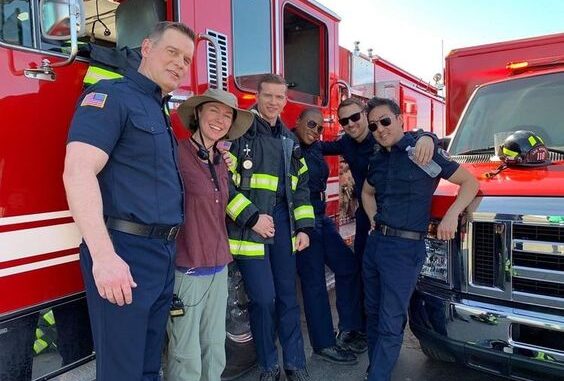
Lone Star’s Intense Final Tragedy Is Ruined By 9-1-1: A Closer Look
Lone Star, the popular spin-off of 9-1-1, has gained a devoted fanbase with its intense, emotional storylines, focusing on firefighters and emergency responders in Texas. The show doesn’t hold back when it comes to powerful narratives—especially when it comes to life-and-death situations. However, in its final tragic moments, many fans were left in disbelief as 9-1-1 seemed to overshadow the deeply emotional climax of Lone Star’s finale.
In this article, we’ll take a deep dive into how the finale of Lone Star’s season was supposed to leave us on the edge of our seats—yet, somehow, the presence of 9-1-1 completely undermined its impact. Let’s explore the events that led to this unfortunate overlap and how it affected the emotional weight of the finale.
The Premise of Lone Star’s Tragic Finale
Lone Star’s finale was built up to be a heart-stopping conclusion to a season filled with high stakes, relationships on the line, and life-or-death decisions. Fans had been eagerly following the storylines of beloved characters, including Captain Owen Strand, who faced an emotionally taxing final showdown. The series set the stage for a devastating loss that promised to break the hearts of viewers, creating a powerful narrative arc.
However, just when the tension was at its peak, 9-1-1 inserted a crossover event that seemed forced and out of place, muddling the emotional weight of Lone Star’s conclusion. This crossover, while exciting for some, distracted from the impending tragedy, reducing its potency and ultimately causing a disservice to the carefully crafted narrative.

9-1-1: The Intrusive Crossover Event
What Was the Crossover Event?
In the finale, a crossover event between Lone Star and 9-1-1 was introduced, which wasn’t a surprise to fans, as the two shows often share storylines. However, the timing of this crossover raised a lot of eyebrows. Rather than adding to the drama, it felt like a disruptor, drawing attention away from the pivotal moments that had been carefully building for the entirety of the season.
The crossover essentially inserted characters and storylines from 9-1-1 into the emotional climax of Lone Star, distracting viewers from the central narrative. While crossover events can often heighten the drama, in this case, it did the opposite. Instead of intensifying the emotional core of the finale, it watered it down with unnecessary plot twists and forced character interactions that didn’t align with the tone of Lone Star.
How the Finale Lost Its Impact
A Buildup to Emotional Chaos
The emotional stakes in Lone Star were high leading up to its tragic finale. Fans had already been invested in the struggles of the characters, particularly Captain Owen Strand, whose journey had been one of overcoming personal loss and tragedy. The series did an excellent job of making us feel the intensity of these challenges.
However, as the final moments of the episode approached, the mood shifted dramatically with the unexpected arrival of the 9-1-1 characters. These outside forces not only diverted attention from the impending tragedy but also made the final moments feel more like a spectacle rather than a heartfelt moment of loss. The powerful, gut-wrenching scene we were promised was instead diluted by unnecessary action-packed sequences.
The Role of 9-1-1 in the Emotional Disconnect
A Contrasting Tone: What Went Wrong?
9-1-1, known for its high-octane, fast-paced action sequences, completely clashes with the tone of Lone Star during its finale. While Lone Star thrives on raw emotion and slow-burning tension, 9-1-1 is all about quick resolutions and dramatic action. By blending these two tones, the crossover created an unfortunate tonal dissonance, which ultimately overshadowed the emotional gravitas that was central to Lone Star’s final moments.
The intense drama in Lone Star had been building up to a heartbreaking climax, but instead of allowing the characters’ pain to land with impact, the sudden shift to the bombastic energy of 9-1-1 felt like a jarring interruption.
The Fans’ Reaction to the Crossover
Disappointment and Confusion
For many viewers, the inclusion of 9-1-1 in the Lone Star finale was more than just a disappointment—it felt like a betrayal of the show’s core essence. Fans had become attached to the understated, emotional storytelling of Lone Star, and the sudden influx of characters from 9-1-1 seemed to water down the impact of the tragic events. This was especially frustrating considering how meticulously Lone Star had set up its emotionally intense moments, only for those to be overshadowed by the spectacle of another show.
Many fans took to social media to express their frustration, noting how the crossover event not only diminished the impact of the finale but also felt more like a stunt to boost ratings rather than a meaningful narrative decision. The emotional resonance of the finale was, in many ways, lost in the shuffle.
The Aftermath: What Could Have Been
A Missed Opportunity for True Emotional Closure
Had the writers of Lone Star chosen to keep the finale focused on the characters and their journey without the need for a crossover, the emotional weight would have been far more potent. The buildup to the tragic events of the finale had the potential to be a moment of pure, unfiltered emotion. However, by introducing 9-1-1 characters into the mix, that moment was compromised.
For a show like Lone Star, which thrives on its human drama and character-driven storylines, the introduction of another show’s energy was like pouring water on a carefully stoked fire. The tragedy we were expecting felt far less impactful, leaving many fans feeling underwhelmed.
The Future of Crossovers: A Cautionary Tale
Should Crossovers Be Avoided in Serious Storylines?
This situation begs the question: should shows like Lone Star incorporate crossovers in their most emotionally intense moments? While crossovers can certainly provide excitement and a sense of community between shows, they can also undermine the emotional integrity of a plot, especially when the shows have vastly different tones.
It’s essential for showrunners to carefully consider when and where to introduce crossover events, particularly during key emotional moments. Sometimes, less is more, and a standalone storyline can create a deeper, more resonant experience for the audience.
Conclusion: The Tragedy That Could Have Been
In conclusion, the final tragedy of Lone Star was a missed opportunity for an emotionally powerful conclusion to a season that had set up high stakes and dramatic tension. The crossover with 9-1-1 ultimately detracted from the emotional impact of the finale, leaving fans with a sense of disappointment rather than catharsis. While crossovers have their place, the finale of Lone Star serves as a cautionary tale of how, when executed poorly, they can ruin what could have been a deeply moving conclusion.
Frequently Asked Questions (FAQs)
1. Why was the crossover between 9-1-1 and Lone Star controversial? The crossover overshadowed the emotional climax of Lone Star‘s finale, diverting attention away from the powerful, tragic moments the show had been building toward.
2. Could Lone Star have had a better finale without the crossover? Yes, many fans feel that Lone Star‘s emotional impact would have been stronger if the finale focused solely on its own characters and storylines.
3. What was the central tragedy in Lone Star‘s finale? The finale centered around a life-and-death situation involving one of the main characters, but the emotional weight was diluted by the sudden introduction of 9-1-1.
4. How did fans react to the 9-1-1 crossover in Lone Star? Fans expressed frustration and disappointment, feeling that the crossover disrupted the emotional tone of the finale.
5. Will future Lone Star episodes feature more crossovers with 9-1-1? While it’s unclear, the negative reaction to this particular crossover may influence future decisions regarding crossovers between the two shows.